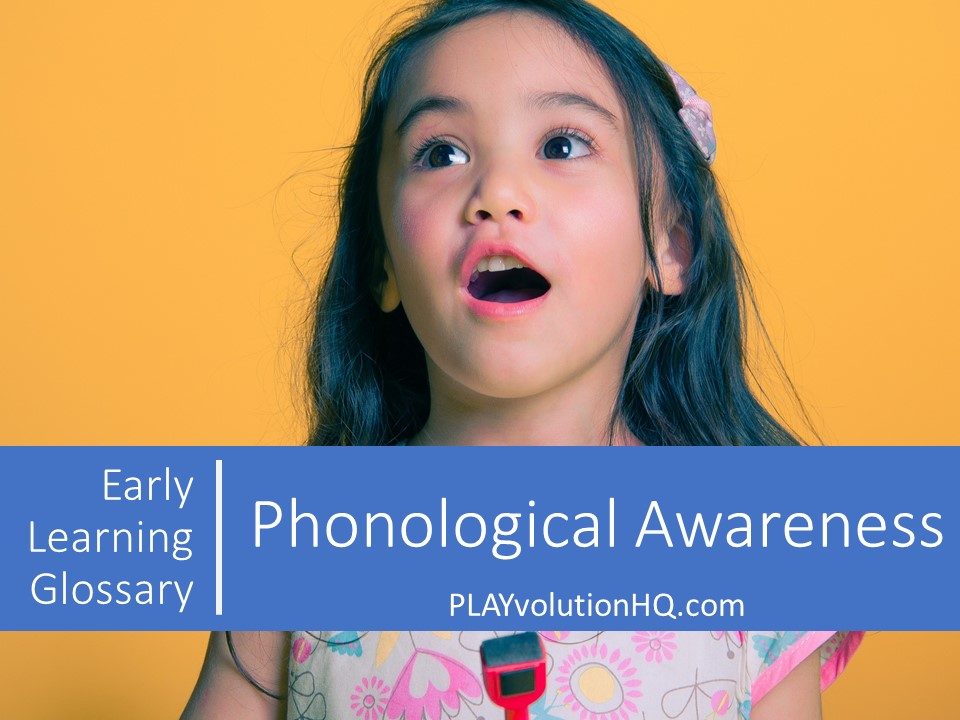Revised | Originally Published: July 3, 2021 @ 7:15 pm

About Phonological Awareness
Simply put, phonological awareness is the ability to recognize, identify, and manipulate the basic sound structures that make up words. These structures are syllables, onsets and rimes, and phonemes.
This awareness usually begins occurring during the third year of life and accelerates in years four and five, although some two-year-olds demonstrate phonological awareness and it may not kick in for some children until they are slightly older.
Phonological awareness lets kids recognize and work with the sounds of spoken language. In preschoolers, it means being able to pick out rhyming words and count the number of syllables in a name. It also involves noticing alliteration (how sounds repeat themselves). For example, “Susie sold six salami sandwiches.” (Preschools usually include this type of language play, songs, rhymes, and stories in their daily activities.)
Kelli Johnson, MA writing at Understood.org
Phonological awareness moves from noticing to doing. After kids recognize rhyming words, they start to come up with rhymes on their own. Once they can identify the number of syllables in a word, they begin to break words apart into syllables or single sounds by listening rather than clapping.
Components Of Phonological Awareness
There are five areas of phonological awareness. They progress from words (the largest pieces of sound) to phonemes (the smallest pieces of sound):
- Word Awareness (understanding that speech is made up of individual words)
- Syllable Awareness (understanding that spoken words are made up of hunks of sound)
- Onset And Rime Awareness (understanding that spoken syllables can be broken down into smaller units)
- Rhyme Awareness (understanding that certain word endings sound alike)
- Phonemic Awareness (understanding that spoken syllables are made of sequences of sounds)
Some Definitions
Word
A distinct unit of spoken language–consisting of a sound or combination of sounds–that conveys meaning. For example, a the specific set of spoken sounds we identify in writing with the letters CAT refers to a furry, four-legged, often aloof, sometime attentive pet.
Syllable
A unit of spoken language consisting of one or more phonemes. The word CAT is made up of a single syllable.
Onset
The initial phonological unit of any syllable that contains an initial consonant or consonant blend. The sound of the letter C in the one syllable word CAT is the word’s onset.
Rime
The string of letters following an onset that contains the vowel and remaining consonants. The two letters AT in CAT make up the word’s rime.
Phoneme
The smallest unit of sound within a word. The word CAT has three phonemes, the /k/, /a/, and /t/ sounds.
Development Of Phonological Awareness
Most children develop phonological awareness–an auditory skill–naturally. They do so through exposure to a language rich environment full of conversations, songs, books, nursery rhymes, word play, oral stories, and play with peers.
Parents and caregivers can support phonological awareness by creating language rich environments for infants and young children. Developing this auditory skills requires direct exposure and interaction with lots of language. Young ears should be awash in conversation, rhymes, songs, and stories. Prolonged exposure to language rich environments is more valuable in developing these auditory skills than worksheets. It’s also probably a good idea to cut down on screen time–especially solitary screen time–since it seems that human-to-human interaction plays an important role in learning these skills.
Additional Support
Some children fail to develop phonological awareness through environmental exposure. Others lack rich language environments in their early years. These children can benefit from direct instruction and other interventions aimed at helping them learn to recognize, identify, and manipulate the sounds that make up words.
As noted above, children develop these skills at different rates, but there are some signs that additional support may be needed. For example, preschoolers who struggle to learn nursery rhymes, don’t enjoy rhyming stories and songs, and have problems recognizing alliteration may need additional support.
Phonological Awareness And Literacy
The skills involved in phonological awareness–understanding and being able to think about and manipulate the sounds that make up speech–are valuable reading and writing skills as well. A child’s phonological awareness skills in prek and kindergarten strongly predict how the child will read later in their school career.
Playvolution HQ Resources
You’ll find our growing collections of children’s rhymes and songs here, recommended children’s books here, and fairy and folk tales here. This post offering tips for successful story times may also be helpful.
Contribute content to Playvolution HQ
Brought to you by Explorations Early Learning
Thoughts On This Entry?
I’d love to hear your thoughts on improving this entry and suggestions for additional glossary additions in the comments below. You can also contact me with comments or concerns.
Browse Trainings
Post Author
Jeff Johnson is an early learning trainer, podcaster, and author who founded Explorations Early Learning, Playvolution HQ, and Play Haven.


Leave a Reply